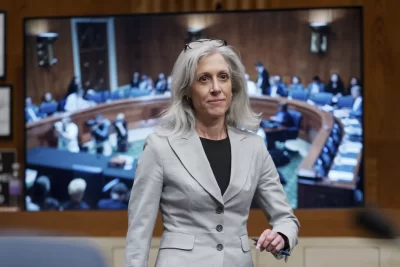
WASHINGTON (AP) — As an independent, Christian Miller can’t vote in Pennsylvania’s closed presidential primary in April. He said it wouldn’t matter even if he could.
“You’re not really voting for anything,” said Miller, who left the Democratic Party in 2022. “Every election I’ve ever seen, the candidates have been decided by the time they get to Pennsylvania.”
Pennsylvania is a crucial presidential swing state and the fifth most populous in the country. And yet holding a primary so much later than other states means its voters often have little say in choosing the presidential contenders. It’s the same for voters in much of the rest of the country.
That dynamic is even more pronounced this year with the front-runners for both major parties in overwhelming position to become the presumptive nominees not long after Super Tuesday, traditionally the biggest day on the election calendar when 16 states hold contests.
Academics and democracy analysts said the presidential primary system, in which a small percentage of the nation’s voters often determines the candidates, is one of several quirks that make the United States stand out. To some, it raises questions about whether the world’s oldest and most prominent democracy might also be among the least representative.
Voter attitudes might be different if the U.S. were more like many countries in the European Union that give all voters a slate of candidates from different parties and then hold a run-off with the top vote-getters, said Danielle Piatkiewicz, deputy chief operating officer at the Alliance of Democracies Foundation, a Denmark-based think tank.
“You don’t have the frustrations of where it’s an either or system,” she said. “Usually you can find a political party that meets your needs.”
Attention to America’s primary system is especially notable this year, a historic one for elections around the world and as polls have consistently shown a deep lack of enthusiasm for a rematch between Democratic President Joe Biden and his predecessor, Republican Donald Trump.
As Tuesday’s contests near, Biden and Trump appear on their way to securing their parties’ nominations even though just eight states will have awarded delegates through presidential primaries or party caucuses by then.
Paula Stevens, 73, is one of those voters unhappy with the candidate options and frustrated that the contests are likely to be decided by the time she is able to vote on March 19, the date of Ohio’s primary.
Grocery shopping north of Columbus, Stevens said she will pass on this year’s presidential contest. She registered Republican in 2016 specifically to vote against Trump, but can’t support Biden this year.
“There’s no choice,” she said.
Nick Troiano, founding executive director of the group Unite America, said the system also fails to engage independent voters, who are prohibited from voting in presidential primaries in 22 states. That’s 24 million voters who end up “stuck with the party nominees” without selecting them, he said.
He said gerrymandering of congressional and state legislative districts highlights another consequence of independents being excluded from many party primaries.
“The primaries are really the only elections that matter because the districts are so uncompetitive these days,” he said.
More than 80% of congressional districts are decided in the primary because the districts lean so heavily in favor of one party or the other. But a much smaller percentage of voters cast ballots in those races: “So we have a rule of the minority, not the majority,” he said.
It’s yet another aspect of elections in the U.S. that sets the country apart. In most states, a partisan legislature draws the legislative and congressional districts and can do so in a way that ensures it will hold onto, and perhaps expand, its power.
The U.S. is “pretty close to the only democracy in the world” that has the participants of the government controlling the redistricting process and making the rules, said Michael Miller, a political scientist who specializes in democratization at George Washington University. “For a huge swath of our country, it’s still parties picking what’s best for the current party in control.”






